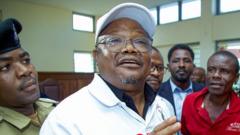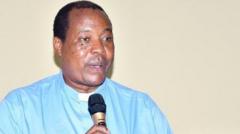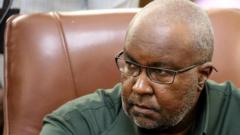As Lissu's party faces disqualification, he continues to advocate reforms that challenge the ruling party's dominance in a tense political landscape.
Tundu Lissu: A Political Survivor Facing a Treacherous Tide in Tanzania

Tundu Lissu: A Political Survivor Facing a Treacherous Tide in Tanzania
The embattled Tanzanian opposition leader grapples with new treason charges as political tensions rise ahead of elections.
In Tanzania, political turbulence is heating up as Tundu Lissu, the leader of the opposition party Chadema and a renowned figure in the fight against government oppression, confronts fresh treason charges. Known for his remarkable resilience, having survived an assassination attempt in 2017, Lissu now finds himself in another perilous situation that could mark a significant shift in his political journey.
The recent escalation comes as Lissu faces charges that could lead to the death penalty, a grim reflection of the sharp political divide in the country. Despite these ominous threats, Lissu remains undeterred, continuing to advocate for critical reforms ahead of the October presidential and parliamentary elections. Having recently been disqualified from participating in the elections, his party's prospects appear bleak.
Lissu's political journey gained traction last year, when frustrations over the party's leadership prompted him to challenge then-chairman Freeman Mbowe. His successful bid for leadership came just before his arrest amid allegations of inciting public rebellion, a claim he vehemently denies. In court, he was not permitted to enter a plea regarding the treason charge.
Lissu's rallying cry has been "no reforms, no elections," asserting that the electoral system is rigged in favor of the ruling CCM party. His determined advocacy has sparked discontent within his ranks, as elements of Chadema, notably the G-55 faction, propose a more conciliatory approach while still pursuing the elections.
The political turmoil is underscored by Chadema's refusal to comply with an electoral code of conduct perceived as a tactic to suppress dissent. During previous local elections, the government’s control was evident, with the CCM overwhelming its opponents in what many termed unfair elections.
International support for Lissu's cause has been vocal, with organizations like Human Rights Watch and the Catholic Church echoing calls for political reform and Lissu's release. Prime Minister Kassim Majaliwa's recent assurances of a fair electoral process contrast with the ongoing detention of political adversaries.
Under President Samia Suluhu Hassan, who succeeded the late John Magufuli, there was initial hope for increased political freedoms. Nevertheless, analysts note a resurgence of state repression reminiscent of Magufuli’s era, where Lissu’s near-fatal encounter occurred.
Amid political discord, Chadema advocates for a series of electoral reforms that seek to establish an independent electoral commission and ensure transparency in any electoral disputes. Yet, pressures from within the party complicate Lissu’s strategy while he aspires to emulate successful protest movements in neighboring countries.
With the current parliament's term set to end soon, concerns grow over the feasibility of implementing Lissu's envisioned reforms in time for the elections. Political analysts warn that Chadema risks losing its status as the primary opposition force if sidelined in the electoral process.
As Lissu's case unfolds and the need for reform intensifies, the future remains uncertain for him and Chadema in Tanzania's challenging political landscape. The upcoming court appearance promises to be a crucial moment in a long struggle for democracy in the nation.
The recent escalation comes as Lissu faces charges that could lead to the death penalty, a grim reflection of the sharp political divide in the country. Despite these ominous threats, Lissu remains undeterred, continuing to advocate for critical reforms ahead of the October presidential and parliamentary elections. Having recently been disqualified from participating in the elections, his party's prospects appear bleak.
Lissu's political journey gained traction last year, when frustrations over the party's leadership prompted him to challenge then-chairman Freeman Mbowe. His successful bid for leadership came just before his arrest amid allegations of inciting public rebellion, a claim he vehemently denies. In court, he was not permitted to enter a plea regarding the treason charge.
Lissu's rallying cry has been "no reforms, no elections," asserting that the electoral system is rigged in favor of the ruling CCM party. His determined advocacy has sparked discontent within his ranks, as elements of Chadema, notably the G-55 faction, propose a more conciliatory approach while still pursuing the elections.
The political turmoil is underscored by Chadema's refusal to comply with an electoral code of conduct perceived as a tactic to suppress dissent. During previous local elections, the government’s control was evident, with the CCM overwhelming its opponents in what many termed unfair elections.
International support for Lissu's cause has been vocal, with organizations like Human Rights Watch and the Catholic Church echoing calls for political reform and Lissu's release. Prime Minister Kassim Majaliwa's recent assurances of a fair electoral process contrast with the ongoing detention of political adversaries.
Under President Samia Suluhu Hassan, who succeeded the late John Magufuli, there was initial hope for increased political freedoms. Nevertheless, analysts note a resurgence of state repression reminiscent of Magufuli’s era, where Lissu’s near-fatal encounter occurred.
Amid political discord, Chadema advocates for a series of electoral reforms that seek to establish an independent electoral commission and ensure transparency in any electoral disputes. Yet, pressures from within the party complicate Lissu’s strategy while he aspires to emulate successful protest movements in neighboring countries.
With the current parliament's term set to end soon, concerns grow over the feasibility of implementing Lissu's envisioned reforms in time for the elections. Political analysts warn that Chadema risks losing its status as the primary opposition force if sidelined in the electoral process.
As Lissu's case unfolds and the need for reform intensifies, the future remains uncertain for him and Chadema in Tanzania's challenging political landscape. The upcoming court appearance promises to be a crucial moment in a long struggle for democracy in the nation.























